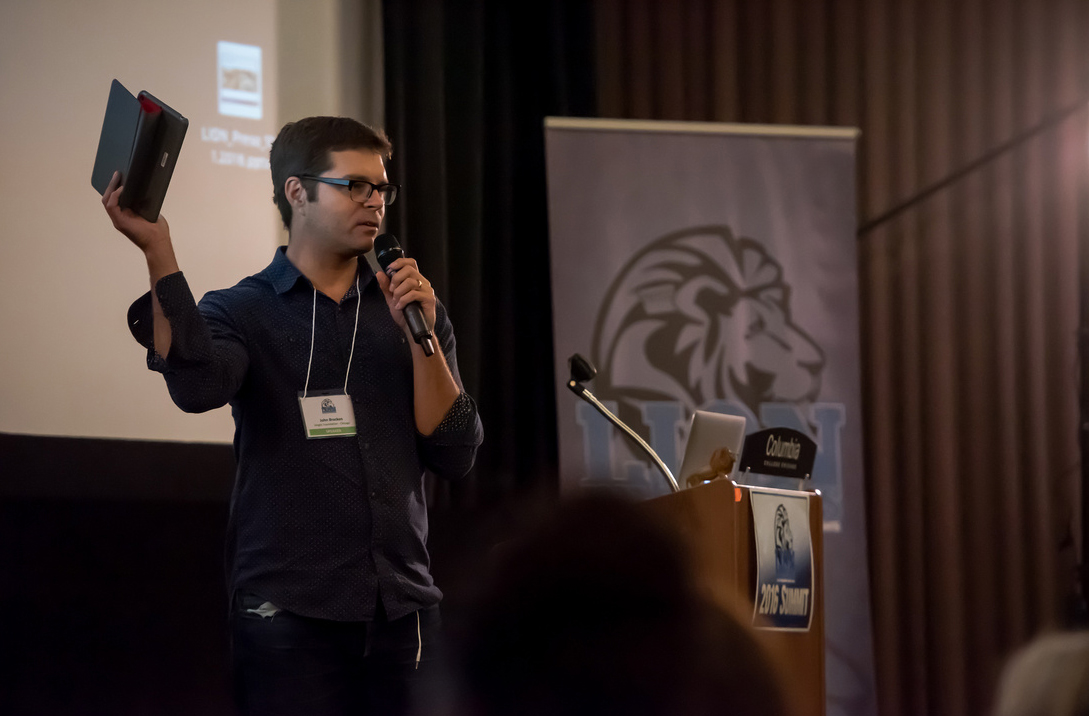Knight Foundation's John Bracken says 'adaptability' is key for news orgs
The vice president of the Knight Foundation’s Technology Innovation program urged attendees of the LION Publishers 2016 Summit in Chicago

The vice president of the Knight Foundation’s Technology Innovation program urged attendees of the LION Publishers 2016 Summit in Chicago Saturday to continue looking around a now-familiar bend. In remarks delivered Saturday afternoon, John Bracken, invoked retired U.S. Army Gen. Stanley McChrystal, advancements in artificial intelligence, and Knight’s just-concluded libraries News Challenge to push local news sites toward innovation.
Bracken offered attendees a phrase that he admitted might not be “an easy thing to say:” Adaptability, Bracken argued — by way of McChrystal — is greater than efficiency.
Later, as he ran through current Knight thinking, Bracken suggested that the organization looks to bridge gaps while it seeks to take advantage of emerging technology.
Bracken also offered summit-goers a slide of wisdom courtesy of design consultancy IDEO. There, he pointed to the design thinking process used by the firm, one it suggests is more “a system of overlapping spaces rather than a sequence of orderly steps.”
On it’s website, IDEO further described the concept:
“There are three spaces to keep in mind: inspiration, ideation, and implementation. Inspiration is the problem or opportunity that motivates the search for solutions. Ideation is the process of generating, developing, and testing ideas. Implementation is the path that leads from the project stage into people’s lives.”
To that end, Bracken noted that in his work, he’d found that the “first idea often fails.”
Bracken also shared his feeling that the March defeat of a world champion Go player by Google’s artificial intelligence entry, Deep Mind, was a milestone. This sentiment echoes one shared by Atlantic writer Christopher Moyer, who argued that the turn wasn’t just about the machine’s victory.
“The important thing to take away from this series is not that DeepMind’s AI can learn to conquer Go, but that by extension it can learn to conquer anything easier than Go — which amounts to a lot of things,” wrote Moyer, “The ways in which we might apply these revolutionary advances in machine learning — in machines’ ability to mimic human creativity and intuition — are virtually endless.”
For his part, Bracken said that he and his colleagues are “still trying to get our heads around” AI.
Turning to the libraries News Challenge, Bracken called the institutions “key vehicles” and pitched them as a bridge space. He cited the use of libraries as a space for learning digital skills, and noted that both children and adults find comfort in those spaces.
“They don’t look or feel like schools,” Bracken offered.
It all fits with a theme echoed throughout Bracken’s presentation, one he noted early on: The “speed at which things are changing is so great,” he said, that it is impossible to keep up.
Sign up for the weekly newsletter
Join the LION mailing list to get our weekly roundup of opportunities and resources for news entrepreneurs. View our most recent issues.
Related Articles
Last call: Apply to receive $600 in travel support to attend the Independent News Sustainability Summit in Chicago
Fill out the travel stipend request form by Sunday, July 21, at midnight ET.
Igniting innovation: How RJI empowers independent news publishers to experiment with new ideas
RJI supports small newsrooms and community-centered journalists as they work to serve their communities.
How The Bedford Citizen prioritized its internal operations to pursue revenue growth and avoid burnout
Through LION’s Sustainability Lab, the team developed a master spreadsheet to track ideas and impact.